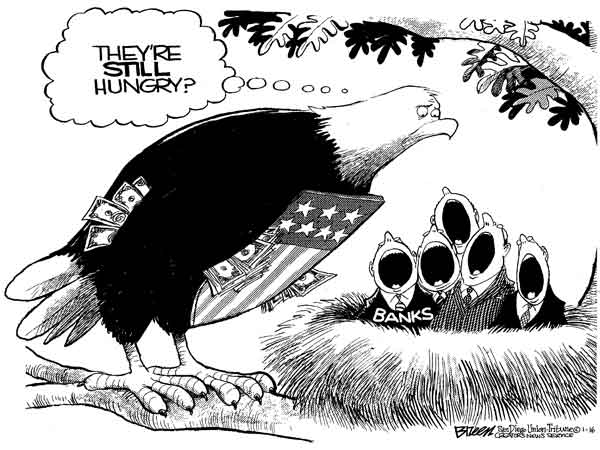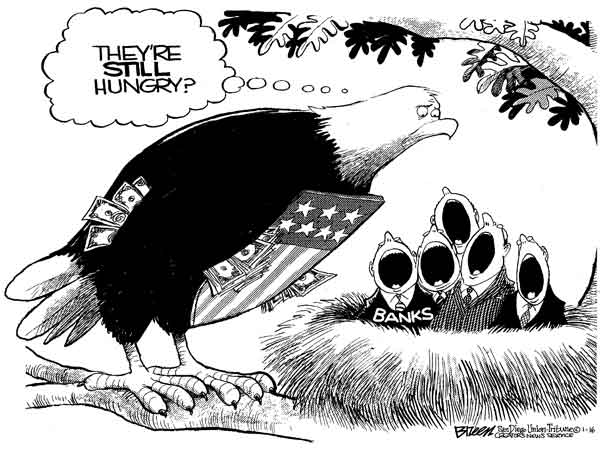
Not accusing Gordon Brown of being Chinese or anything except that, in the context of banking, he does seem to have taken a leaf out of the book of the Chinese leadership of Hu Jintao.
As alluded to yesterday, China's answer to the economic meltdown is to tell the banks to lend, no matter what the costs or risks, with new lending jumping 1000% in December as rules on loans to deposits ratios were eased.
Now that's not what the Government here are saying, but they do want the banks to return to lending. That is why the UK government is to offer banks guarantees on existing loans to the value of possibly £200 billion ($300 billion) to try to get new lending started again.
Rather than a Septic Bank, we're creating a Toxic Insurance Firm.
The headlines of the announcement are likely to be:
- the ability to move toxic assets off the bank
balance sheets through an insurance scheme to guarantee payments against such assets, - guarantees
on new consumer loans, - softening the terms of £37 billion recapitalisation of Royal Bank of Scotland (RBS),
Lloyds TSB and HBOS last October.
The last point is an interesting one. Last October, £9 billion ($13.5 billion) of the £37 billion ($50 billion) provided by the government for the banks' recapitalisation, was in the form of preference shares charged at 12% interest.
Now, banks will be offered the chance to convert these preference shares into
ordinary shares, reducing the interest rate charged to a more reasonable 5% or thereabouts, but increasing the government’s equity stake by the same token.
In the case of RBS, this nationalises the bank even further as the government's stake would increase from being 57.9% state-owned to 70%, and now with voting rights too.
A quick round robin of the Sunday Tabloids:
The Times, "You can’t fast-track a financial meltdown"
"The government is expected to underwrite toxic
assets on the balance sheets of Britain’s beleaguered banks — a move
designed to enable banks to start lending again. We would all like to think
it is the final act required to start turning round our economy. Think
again. Against a backdrop of fear about the scale of the toxic assets held
within banks and the denial, this could end up being another
sticking-plaster initiative."
The Independent, "Taxpayers could be liable for £200bn in toxic bank loans"
"The 'safety net' proposal, being hammered out by the Prime Minister,
the Chancellor, Alistair Darling, and bank bosses, would require
institutions to identify their most troublesome loans and pay into a
state-sponsored insurance scheme. Although the liabilities would still be
owned by the banks, taxpayers would ultimately have to pick up the tab for
losses greater than an agreed amount."
Meanwhile the Sunday Telegraph, the Conservative's paper, went to town on the whole debacle:
£200bn to save banks from bad debt: "The taxpayer will be forced to underwrite up to £200 billion of bad banking
debt under a government plan to take control of assets belonging to
Britain's major high street lenders, The Daily Telegraph can disclose ... that equates to about £33,000 per taxpayer."
Taxpayers face years of debt in bank salvage deal: "Were taxpayers to directly acquire the banks' worst assets, one of the major
problems would have been valuing them. The insurance scheme puts less
pressure on the Government and banks to strike a price for toxic assets.
Lenders would keep their bad debts on their books but they would be
underwritten by the taxpayer."
80 per cent of bank lending 'went overseas':
"Britain's banks are facing a rising tide of Government anger after it emerged that up to 80 per cent of their lending has been to overseas borrowers"
The last point is particularly going to create an irate storm amongst the politicians and public, as it is this uncovering of toxic debt to predominantly overseas firms that apparently sparked Gordon Brown's anger, and the need for another major bailout plan.
A Government source said: "It was pretty breathtaking to discover these
figures. They provide further evidence that so many of the problems we are
all facing started with bad banking practice on the international markets
and were not simply caused by problems with the British economy."
So the UK taxpayer is left with the debt of foreign firms and individuals caused by banks irrational growth plans fuelled through leveraged lending.
No wonder Ed Miliband, the Government's Climate Secretary, made a speech to the Fabian Society saying that: "This
is no ordinary time because, in the same way that September 11 shook the
foundations of a thesis about foreign policy ... so the economic events we have witnessed have done the
same to our domestic politics."
The banking system collapse is as crippling as the 9/11 terrorist attacks on the world trade centre?
Strong words, but maybe not far off the mark.
What it really means is that the Government needs to become far more of an 'activist investor' in the banking system, and tell the banks' management teams what actions to take.
This is true in China and the USA. For example, interesting article over at Caller.com that says the US Government is already starting to flex muscles, after telling Vikram Pandit to restructure and breakup Citigroup.
Charles
Elson, director of the Weinberg Center for Corporate Governance at
University of Delaware, is quoted: "When the government says move, banks have to move. The government
trumps any decision coming from management or the board."
Too right!
Result: Gordon Brown and Alastair Darling will tell the banks to lend, just as Hu Jintao has in China.
The Feng Shui is written on the wall, and I have seen one economist forecast that Britain will go cap-in-hand to the International Monetary Fund this year ... we shall see.
The BBC's website provides a useful insight into this crisis, with the following key actions taken for the UK banking sector since Lehman Brothers collapsed:
17 September 2008
Lloyds TSB announces it is to take over Britain's biggest mortgage lender HBOS in a
£12bn deal creating a banking giant holding close to
one-third of the UK's savings and mortgage market. The deal follows a run on
HBOS shares.
29 September 2008
In Britain, the mortgage lender Bradford & Bingley is
nationalised. The British government takes control of the
bank's £50bn mortgages and loans, while its savings operations and branches are
sold to Spain's Santander.
3 October 2008
The UK's City watchdog, the Financial Services Authority (FSA) raises the limit of the
amount of deposits that are guaranteed should a bank go bust to £50,000.
8 October 2008
The UK government announces details of a rescue package for the banking system worth at least £50bn ($88bn) and offering up to £200bn ($350bn) in short-term lending
support, as well as injecting a further £250bn ($440bn) into the money markets.
13 October 2008
The UK government announces plans to pump billions of pounds of taxpayers'
money into three UK banks in one of the UK's biggest nationalisations. Royal Bank of Scotland (RBS), Lloyds TSB
and HBOS will have a total of £37bn ($50bn) injected into them.
14 January 2009
The UK government unveils a plan to guarantee up to £20bn ($30bn) of loans to
small and medium-sized firms, to help them survive the
downturn.
Ah well ... with over $1,000,000,000,000 ($1 trillion) of cash that the UK has put into the banking system so far, what's another $300,000,000,000 ($300 billion) between friends.

Steve Breen, San Diego Union Tribune, January 16, 2009
Chris M Skinner
Chris Skinner is best known as an independent commentator on the financial markets through his blog, TheFinanser.com, as author of the bestselling book Digital Bank, and Chair of the European networking forum the Financial Services Club. He has been voted one of the most influential people in banking by The Financial Brand (as well as one of the best blogs), a FinTech Titan (Next Bank), one of the Fintech Leaders you need to follow (City AM, Deluxe and Jax Finance), as well as one of the Top 40 most influential people in financial technology by the Wall Street Journal's Financial News. To learn more click here...






















